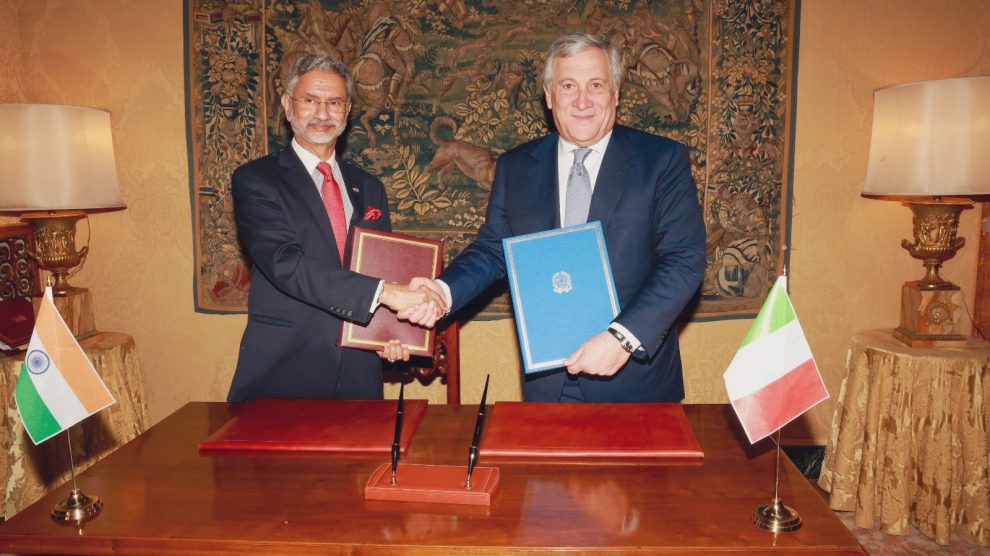New Delhi comes to Rome. On Thursday, Indian Foreign Minister Subrahmanyam Jaishankar met his Italian counterpart Antonio Tajani and Defence Minister Guido Crosetto in Rome. Previously, he had an encounter with the Senate’s Foreign Affairs and Defence and European Union Policies Committees in a joint session. Then, on Friday, he touched base with Enterprise Minister Adolfo Urso (just back from the UK’s AI Safety Summit) and finally President Sergio Mattarella.
Closer engagement. Beyond signing a number of agreements, FMs Tajani and Jaishankar discussed the main regional and international security issues. India is closely watching developments in Ukraine as well as the Middle East crisis, where New Delhi is very active through its participation in mini-lateral systems such as I2U2 and pushing for the creation of the India-Middle East-Europe Economic Corridor (IMEC).
- This future corridor is a concrete representation of the value of Italian-Indian relations, spurring new lines of communication and supply, passages of digital and green-tech connections, as well as the concept of interlinking the Indo-Med, a geostrategic construct that moves along the geopolitical interconnections between the enlarged Mediterranean and the Indo-Pacific.
“We find a partner in Italy,” summarised Minister Jaishankar, noting that Rome had supported many of India’s initiatives. He mentioned IMEC, the International Solar Alliance (ISA), the Coalition for Disaster Resilient Infrastructure (CDRI), the Global Biofuels Alliance (GBA), and the Indo-Pacific Oceans Initiative (IPOI) as collaborative environments. He then thanked Italy for the “great support during the G-20 presidency” and expressed “enthusiasm” for Italy’s and the EU’s rekindled interest in the Indo-Pacific.
- He also said he’s optimistic that India and the EU would reach a free trade agreement, as “negotiations are progressing,” and the deal would be upheld globally as “one of the highest standards.”
- Meanwhile, Italy and India signed a Migration Mobility Partnership Agreement to facilitate people-to-people relations between the two countries.
Global south and continued cooperation are the names of the game. Minister Jaishankar’s visit hinged on the strategic partnership ushered in by Prime Ministers Giorgia Meloni and Narendra Modi during the former’s New Delhi visit in March. A recent deal signed by Minister Crosetto and his homologue Rajnath Singh concerns defence and security, involving direct collaborations – such as those in the western Indian Ocean – and military procurement.
- Another plan is about general diplomacy, which also entails the possibility of increasing cooperation in third countries. One shared objective is the Global South, towards which both India’s visions and Italy’s strategic thoughts are oriented. In particular, Rome has singled it out as a key priority for its G-7 presidentship in 2024, where New Delhi will probably be a special guest.
- During this year’s Indian-led G-20, the forum was enlarged to include the African Union, no longer an invitee but a permanent member of the so-called “G-21.”
- India is also keen to learn the details of Italy’s Mattei Plan, which will act as a new framework for Italy-Africa cooperation.
Time for celebration. As the Italian Foreign Ministry recalled, 2023 marks the 75th anniversary of diplomatic relations between Italy and India. An occasion that Rome and New Delhi seem intent on celebrating with a further deepening of bilateral cooperation, which has already “deepened rapidly and consistently in recent months, following the launch of the Strategic Partnership and thanks to the commitment of the two governments.”
- “Political dialogue has intensified, with frequent exchanges of visits, an important agreement on Defence has been signed, and a strong impulse has been given to economic cooperation: trade interchange has more than doubled in the last two years and (in the first six months of 2023 alone) the increase in Italy’s exports was 12.2%.”
Image: @DrSJaishankar





